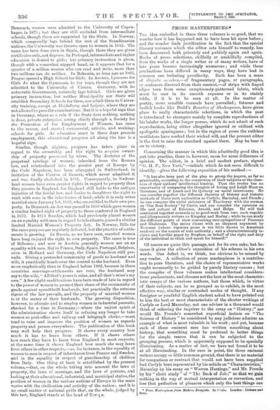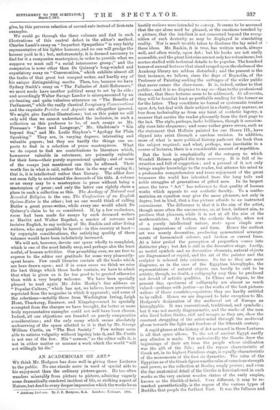PROSE MASTERPIECES.*
THE idea embodied in these three volumes is so good, that we wonder how it has happened not to have been hit upon before ;
and the wonder finds justification in the fact that the special literary nuisance which the editor sets himself to remedy, has been denounced both privately and publicly again and again.
Books of prose selections, skilfully or unskilfully compiled, from the works of a single writer or of many writers, have of late years become increasingly numerous ; and while these productions have differed in many ways, they have had in common one irritating peculiarity. Each has been a mass of disjecta meenbra,— of fragmentary pages, or paragraphs, or sentences divorced from their context,—of strips with frayed edges torn from some sumptuously-patterned fabric, which
must be seen in its smooth expanse or in its stately folds, if it is to be seen at all. In the matter of poetry, more sensible counsels have prevailed ; fatuous and
foolish books like Dodd's Beauties of Shakespeare, have given place to really characteristic selections, in which the poet is introduced to strangers mainly by complete reproductions of his briefer works, the longer poems, which do not admit of such reproduction, being either altogether ignored or utilised with apologetic sparingness ; but in the region of prose the ruthless mutilators have worked their wicked will, and the present editor is the first to raise the standard against them. May he bear it on to victory.
Concerning the manner in which this admittedly good idea is put into practice, there is, however, room for some difference of opinion. The editor, in a brief and modest preface, signed " G. H. P., New York,"—initials which do not seem difficult to identify,—gives the following exposition of his method :—
" It has also been part of the plan to group the papers, as far as practicable, according to the connection of their subjects or the closeness of their authors' intellectual kinship. Thus the reader has an opportunity of comparing the thoughts of Irving and Leigh Hunt on literature, and of Lamb and De Qaincey on social intercourse. He can consider together the different theories of history and historic methods of three such authorities as Carlyle, Macaulay, and Fronde ; he can compare the social strictures of Thackeray with the sermon on Our Best Society' by Curtis, and can consider the opinions on life and culture of Emerson, Arnold, and Helps. He will find associated together counsels as to good-work from two such capable and idiosyncratic writers as Kingsley and Morley ; while he can study the different points of view concerning race-sympathies of Freeman and Gladstone. The series closes with an eloquent argument by Newman (whose vigorous prose is too little known to American readers) on the source of true authority ; and a characteristically incisive and forcible paper by Stephen, on behalf of the right and duty of the individual to think and speak for himself."
Of course we quote this passage, not for its own sake, but because it gives the editor's exposition of his scheme in his own words. One defect is, we think, too obvious to be missed by any reader. A collection of prose masterpieces is a contribu tion to pure literature, and the choice of representative works ought necessarily to be guided by purely literary canons ; but the compiler of these volumes makes intellectual considerations predominate, and chooses not the best or the most characteristic essays of the various authors, but those which, in virtue of their subjects, can be so grouped as to exhibit, in the most effective way, similar or contrasted modes of thought. If any foreigner or youthful English student asked to have pointed out to him the best or most characteristic of the shorter writings of Carlyle or Lord Macaulay, not one adviser in a thousand would think of referring the inquirer to the essay on " History ;" nor would Mr. Fronde's somewhat superficial lecture on " The Science of History" be considered by any judicious admirer an example of what is most valuable in his work ; and yet, because each of these eminent men has written something about history, that something must be preferred to better things for the simple reason that it can be subjected to the grouping process, which is apparently supposed to be specially illuminating. As a matter of fact, we have not found it to be
at all illuminating. In the case in point, the three eminent writers occupy so little common ground, that there is no material for comparison or contrast that would not have been supplied had Carlyle been represented by his article on" Characteristics," Macaulay by his essay on " Warren Hastings," and Mr. Fronde by his " short study " of " The Book of Job ;" so that we gain nothing in the way of mutual interpretation or correction, and lose that perfection of pleasure which only the best things can
give, by this perverse selection of second-rate instead of first-rate examples.
We could go through the three volumes and find in each illustrations of this central defect in the editor's method. Charles Lamb's essay on " Imperfect Sympathies " is very fairly representative of his lighter humour, and no one will grudge the honour paid to it ; but, unfortunately, it is deemed necessary to find for it a companion masterpiece, in order to provide what we suppose we must call "a social intercourse group ;" and the companion is none other than De Quincey's long-winded and expatiatory essay on " Conversation," which exhibits almost all the faults of that great but unequal writer, and hardly any of his unique distinguishing merits. Then, too, because we have Sydney Smith's essay on "The Fallacies of Anti-Reformers," we must needs have another political essay to set by its side ; and accordingly Walter Savage Landor is misrepresented by an air-beating and quite valueless utterance on "The Benefits of Parliament," while the really classical Imaginary Conversations and the exquisite Pericles and Aspasia are altogether ignored. We might give further illustrations; but on this point we will only add that we cannot understand the inclusion, in such a collection as this professes to be, of such essays as Mr. Freeman's " Race and Language," Mr. Gladstone's " Kin beyond Sea," and Mr. Leslie Stephen's " Apology for Plain Speaking." They are, in varying degrees, interesting and valuable papers ; but they are hardly the things one expects to find in a selection of prose masterpieces. What we do expect to find are contributions to literature which, howsoever valuable in substance, are primarily valuable for their form—their purely expressional quality ; and of none of the essays just mentioned can this be affirmed. Their worth lies in what is said, rather than in the way of saying it ; that is, it is intellectual rather than literary. The editor does not seem fully to understand the demands of his title. A volume or an essay may be a masterpiece in prose without being a masterpiece of prose ; and only the latter can rightly claim a place in such a collection as this. The Analogy of Natural and Revealed Religion is the one, The Confessions of an English Opium-Eater is the other ; but no one would think of calling Butler a great prose-writer, while every one would admit De Quincey's claim to be so considered. If, by a few exclusions, room had been made for essays by such deceased writers as Hazlitt and Walter Bagehot, a master of nervous and incisive English, to say nothing of Mr. Ruskin and other living writers, who may possibly be barred—in this country at least— by copyright considerations, the satisfying quality of these volumes would have been indefinitely increased.
We will not, however, devote our space wholly to complaint, which is one of the most fatally easy, and perhaps also the least useful, of human activities. Our grumbling over, we are free to express to the editor our gratitude for some very pleasantlyspent hours. Few small libraries contain all the books which are here drawn upon ; and if in some cases we think we miss the best things which those books contain, we have to admit that what is given us is far too good to be greeted otherwise than with a very hearty welcome. We have been specially pleased to read again Mr. John Morley's fine address on "Popular Culture," which has not, we believe, been previously reprinted from the magazine in which it appeared ; and some of the selections—notably those from Washington Irving, Leigh Hunt, Thackeray, Emerson, and Kingsley—must be specially exempted from the charges we have brought, for better or more truly representative examples could not well have been chosen. Indeed, all our objections are founded on purely comparative considerations ; and the only essay which seems absolutely undeserving of the space allotted to it is that by Mr. George William Curtis, on "The Best Society." Few writers seem able to satirise vulgarity without lapsing into it, and Mr. Curtis is not one of the few. His " sermon," as the editor calls it, is not in either matter or manner a work which the world "will not willingly let die."















































 Previous page
Previous page